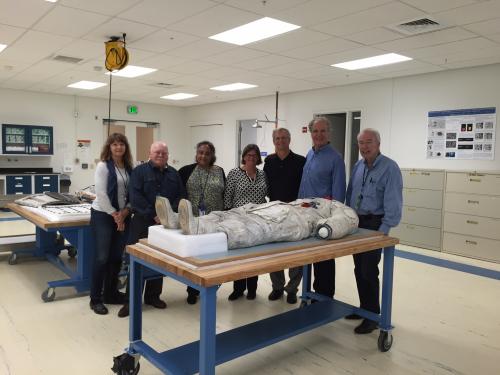
Stories of daring, stories of technological feats, stories of prevailing against the odds ... these are the stories we tell at the National Air and Space Museum. Dive in to the stories below to discover, learn, and be inspired.
Showing 1251 - 1260 of 1761

November 27, 2015
Our conservation team had the pleasure of hosting Alan Eustace, former Google executive, engineer, and stratospheric explorer, this month in the Emil Buehler Conservation Laboratory. Eustace and his StratEx team are well known for their three world records including one for the highest altitude jump at 41,422 meters (135,899 feet) in 2014. The adventurer was in town giving a lecture about his historic jump and to donate to the Museum the suit, life support, and balloon equipment module he used during the jump.

November 24, 2015
We’re gearing up for one of our busiest times of the year—the holidays! Our team of Visitor Services staff love to talk to visitors during this time. We enjoy learning where you’re visiting from and what made you add our Museum to your already impressively full itinerary. You can find us at the Welcome Center in blue vests, eager to hear your stories.

November 21, 2015
Known for devising innovative and intricate spacecraft trajectories, and for his whole-hearted dedication to robotic space exploration, Robert “Bob” Farquhar left a strong impression on the American space program.

November 19, 2015
Many families have their own Thanksgiving traditions that they faithfully recreate each November—Grandma’s stuffing, Aunt Jean’s serving platter, homemade cranberry sauce, or an insistence upon the canned sauce with ridges. After the meal, it may be nap time or football time. But the most common tradition is cooking and eating a big, fat Thanksgiving turkey. The collections in the National Air and Space Museum Archives provide a cornucopia of images and information on the history of aviation and spaceflight, some with moments of Thanksgiving cheer.
November 17, 2015
The Allied Victory in World War II was one of cooperation, not just on the battlefield, but in the laboratory. Microwave radar, jet propulsion, gyroscopic gunsights, and even penicillin were key innovations critical to American military success.

November 12, 2015
Apollo artifacts have begun to receive increased scrutiny in light of recent discussions about returning humans to the Moon and the upcoming 50th anniversary of the historic Apollo missions. What did astronauts of the 1960s and 1970s bring back from the Moon? What was left behind? And how can we verify the authenticity of any of those objects if they have been or will be recovered?

November 10, 2015
On May 5, 1961, Alan Shepard became the first American in space. However, three months earlier NASA had launched “Number 65” on a mission that helped pave the way for Shephard’s momentous flight. Number 65 was a male chimpanzee born in 1957 in the French Cameroons in West Africa.

November 06, 2015
I’ve done a lot of “cool” things as an educator at this Museum: performed a solar system dance with Miss America, chatted with astronauts, and given people their first awe-inspiring views through a telescope. But I have to say, my most recent experience was truly out of this world. On Monday, October 19, 2015, I participated in the second Astronomy Night at the White House. This event is designed to get youth excited about astronomy, space exploration, science, and engineering.

November 02, 2015
A few weeks ago we made a huge announcement that our Explainers Program would be expanding. The exciting news made us ponder: What does it mean to be an Explainer? So we sat down with two of them to find out.

October 29, 2015
From witches to winged demons, humanity has long harbored a horror of airborne denizens. Even when we ventured forth into the heavens without supernatural support, we sometimes adopted some truly terrifying attire.
